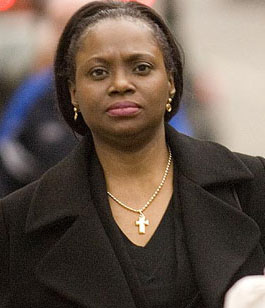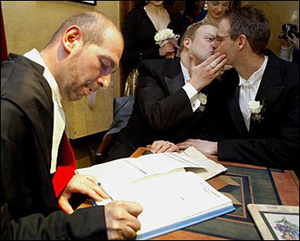 |
Homosexuality and the Clergy
An English Court Sets an Important Precedent
Religious Beliefs against Homosexuality
Must Be Respected
Margaret Galitzin
This is to offer a bit of encouragement from England for Catholics overwhelmed by oppressive juridical penalties against those combating the aggressive homosexual/lesbian policies of forcing acceptance of this unnatural vice on society. A Catholic registrar at Islington Council in North London who was harassed and discriminated against after she refused to carry out same-sex civil partnership ceremonies has won a key legal battle. It seems to me there are important juridical lessons to be learned in this tribunal case, which establishes a salutary precedent for all who are defending our religious right to oppose homosexuality, principally in schools or workplaces.

Lillian Ladele: 'Gay' rights should not be used to harass people over their religious beliefs | |
Lillian Ladele, 47, was a registrar of the Islington Council in North London since 2002. After the Civil Partnership Act (homosexual “marriage”) came into effect in December 2005, she traded duties with colleagues to avoid civil-partnership ceremonies because of her religious belief that sexual relations belonged exclusively to a man and a woman within marriage. (1)
Of course, that did not sit well with politically correct members of the Council. Ladele said she was harassed and treated like a pariah at the workplace. Then the ultimatum came from her superiors: she must perform the so-called homosexual-lesbian marriages or lose her job.
But Ladele was determined to fight. She filed suit against Islington Council, accusing them of discrimination and of showing no respect for her religious beliefs.
The Central London Employment Tribunal unanimously upheld that the Council had “disregarded and displayed no respect for Miss Ladele’s genuinely held beliefs.” The Tribunal also judged that the Council had "violated" Ladele’s dignity and helped create an “intimidating, degrading and offensive environment.” (2)
“Islington Council rightly considered the importance of the right of the gay community not to be discriminated against but did not consider the right of Miss Ladele as a member of a religious group,” the panel said. After the ruling, Ladele hailed the decision as “a victory for religious liberty, not just for myself, but for others in a similar position to mine. Gay rights should not be used as an excuse to bully or harass people over their religious beliefs.”(3)
The tribunal heard evidence from other local authorities, including Kent Court Council and London Borough of Newham, which had made arrangements for members of their staff to opt-out of civil partnership ceremonies. Based on the Ladele ruling, employers now are being advised to consider religious objections from their staff regarding homosexuality.
Miss Ladele is entitled to compensation for religious discrimination, which she can expect in September. The battle may not be over, however. Islington Council is considering appealing the decision. That is to be expected, since outraged gay rights groups are entering the picture with loud protests of injustice and discrimination.
Two important lessons
There are, in my opinion, two important points in this case. First, Lillian Ladele took up the fight and launched proceedings against Islington Council. Instead of giving in to the intimidating, ‘gay’-complacent liberal milieu, she had the courage to stand her ground. “Just because a person has traditional beliefs on marriage does not mean they should be treated any less respectfully,” she asserted at her hearing. (3)

In many countries laws are being passed permitting "gay marriages." Above, homosexuals in Toronto. | |
Second, it is good for Catholics to study the way she fought. Her action was successful because she expressed her objection in explicitly religious terms, claiming the same-sex ceremonies went against her faith. Catholic lawyer and Labor peer Lord Brennan told The Tablet the case re-established the concept of conscience at a time when it had become unfashionable in the secular world: “The case illustrates the fact that in all walks of life people have the right to religious belief and conscience, and it is a right that must be respected and cannot be ignored.” (4)
Thomas Norton, journalist of The Tablet, noted that her case marked a clear contrast to the case filed by Andrew McClintock, a justice of the peace who resigned because he was denied permission to sit out cases involving ‘gay’ adoption. His case failed last year because he did not express his objection to ‘gay’ adoption in explicitly religious terms. (5)
If you ever face a similar problem, don’t forget this: If you argue based on your civil rights, most probably you will lose. Instead, if you make a clear argument based on your religious beliefs, you may well win.
1. “Tribunal sparks debate over religious convictions in the workplace,” The Tablet, July 19, 2008, p. 39.
2. Ibid.
3. “Christian registrar who refused to conduct gay weddings wins case.” United Kingdom Telegraph online, July 21, 2008
4. “Registrar who says she won’t do gay weddings,” London Daily Mail online, July 13, 2008
5.“Tribunal sparks debate, The Tablet, p. 39.

Posted August 25, 2008

Related Topics of Interest
 Homosexuals Cause Nausea to Our Lord and Are Despised by the Devil Homosexuals Cause Nausea to Our Lord and Are Despised by the Devil
 Same-Sex Marriage and the California Bishops Same-Sex Marriage and the California Bishops
 Ratzinger on the Sex Scandal Ratzinger on the Sex Scandal
 Holy Redeemer Parish Marches in "Gay Parade" Holy Redeemer Parish Marches in "Gay Parade"
 Please Act on Evidence that Card. McCarrick Is a Homosexual Please Act on Evidence that Card. McCarrick Is a Homosexual
 Paul VI's Homosexuality: Rumor or Reality? Paul VI's Homosexuality: Rumor or Reality?
 One Sins by Not Becoming Duly Irate One Sins by Not Becoming Duly Irate
 A Dispute Over the Rainbow A Dispute Over the Rainbow
 Vice-Rector of Austrian Seminary Shown in Homosexual Behavior Vice-Rector of Austrian Seminary Shown in Homosexual Behavior


|
Homosexuality | Hot Topics | Home | Books | CDs | Search | Contact Us | Donate

© 2002- Tradition in Action, Inc. All Rights Reserved
|
 |
|